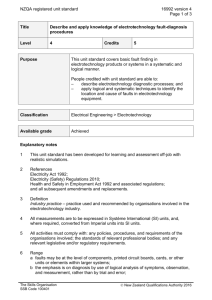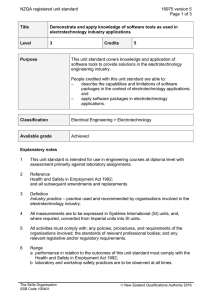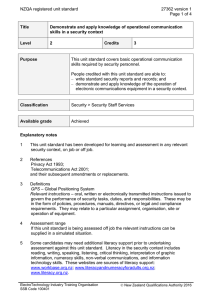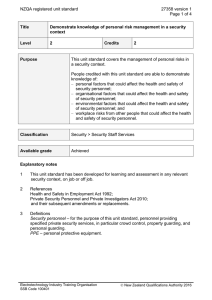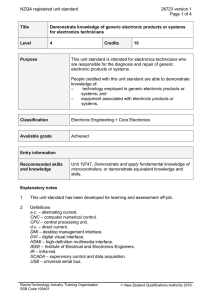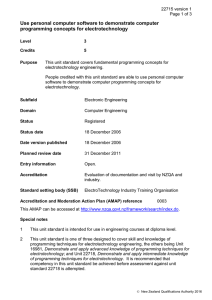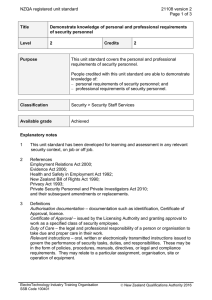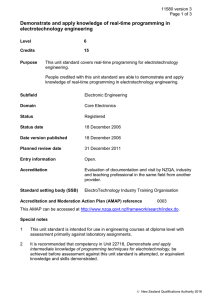NZQA registered unit standard 16991 version 5 Page 1 of 3
advertisement
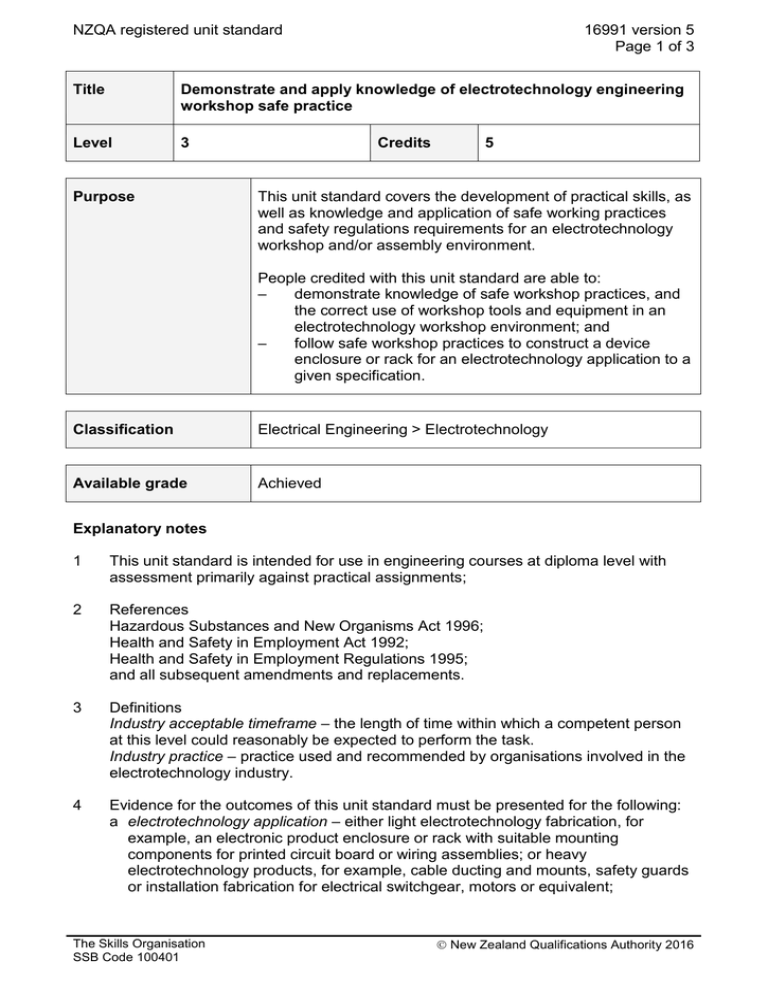
NZQA registered unit standard 16991 version 5 Page 1 of 3 Title Demonstrate and apply knowledge of electrotechnology engineering workshop safe practice Level 3 Purpose Credits 5 This unit standard covers the development of practical skills, as well as knowledge and application of safe working practices and safety regulations requirements for an electrotechnology workshop and/or assembly environment. People credited with this unit standard are able to: – demonstrate knowledge of safe workshop practices, and the correct use of workshop tools and equipment in an electrotechnology workshop environment; and – follow safe workshop practices to construct a device enclosure or rack for an electrotechnology application to a given specification. Classification Electrical Engineering > Electrotechnology Available grade Achieved Explanatory notes 1 This unit standard is intended for use in engineering courses at diploma level with assessment primarily against practical assignments; 2 References Hazardous Substances and New Organisms Act 1996; Health and Safety in Employment Act 1992; Health and Safety in Employment Regulations 1995; and all subsequent amendments and replacements. 3 Definitions Industry acceptable timeframe – the length of time within which a competent person at this level could reasonably be expected to perform the task. Industry practice – practice used and recommended by organisations involved in the electrotechnology industry. 4 Evidence for the outcomes of this unit standard must be presented for the following: a electrotechnology application – either light electrotechnology fabrication, for example, an electronic product enclosure or rack with suitable mounting components for printed circuit board or wiring assemblies; or heavy electrotechnology products, for example, cable ducting and mounts, safety guards or installation fabrication for electrical switchgear, motors or equivalent; The Skills Organisation SSB Code 100401 New Zealand Qualifications Authority 2016 NZQA registered unit standard 16991 version 5 Page 2 of 3 b handtools – screwdrivers, spanners, torque wrench, power drill, metal saw, tin snips, rivet gun, files; c workshop equipment – includes but is not limited to – vices, bench drills sheet metal equipment; d common measuring tools – such as micrometers and vernier callipers; e electrotechnology equipment and tools – either for light electrotechnology or heavy electrotechnology applications. 5 All measurements are to be expressed in Système International (SI) units, and, where required, converted from Imperial units into SI units. 6 All activities must comply with: any policies, procedures, and requirements of the organisations involved; the standards of relevant professional bodies; and any relevant legislative and/or regulatory requirements. 7 Range a performance in relation to the outcomes of this unit standard must comply with the Health and Safety in Employment Act 1992; b laboratory and workshop safety practices are to be observed at all times. Outcomes and evidence requirements Outcome 1 Demonstrate knowledge of safe workshop practices, and the correct use of workshop tools and equipment in an electrotechnology workshop environment. Evidence requirements 1.1 Workshop and assembly skills and safe workshop practice are explained in accordance with industry practice. Range personal protection; clothing; handling, use, and storage of all tools, equipment, and materials; clear ways; clear space; workshop behaviour; signage; observance of all rules; safety equipment and guards. Outcome 2 Follow safe workshop practices to construct a device enclosure or rack for an electrotechnology application to a given specification. Range may include but is not limited to – metals, plastic, wood. Evidence of at least two materials is required. Evidence requirements 2.1 An electrotechnology device enclosure or rack is constructed to a given specification in accordance with industry and safe working practice. Range The Skills Organisation SSB Code 100401 construction is to be completed within an industry acceptable timeframe. New Zealand Qualifications Authority 2016 NZQA registered unit standard 2.2 16991 version 5 Page 3 of 3 Measurements taken in accordance with industry practice confirm that the electrotechnology device enclosure or rack is within specified tolerances. Planned review date 31 December 2014 Status information and last date for assessment for superseded versions Process Version Date Last Date for Assessment Registration 1 27 April 2000 31 December 2013 Revision 2 3 April 2001 31 December 2013 Review 3 18 December 2006 N/A Rollover and Revision 4 15 March 2012 N/A Revision 5 15 January 2014 N/A Consent and Moderation Requirements (CMR) reference 0003 This CMR can be accessed at http://www.nzqa.govt.nz/framework/search/index.do. Please note Providers must be granted consent to assess against standards (accredited) by NZQA, before they can report credits from assessment against unit standards or deliver courses of study leading to that assessment. Industry Training Organisations must be granted consent to assess against standards by NZQA before they can register credits from assessment against unit standards. Providers and Industry Training Organisations, which have been granted consent and which are assessing against unit standards must engage with the moderation system that applies to those standards. Requirements for consent to assess and an outline of the moderation system that applies to this standard are outlined in the Consent and Moderation Requirements (CMR). The CMR also includes useful information about special requirements for organisations wishing to develop education and training programmes, such as minimum qualifications for tutors and assessors, and special resource requirements. Comments on this unit standard Please contact The Skills Organisation reviewcomments@skills.org.nz if you wish to suggest changes to the content of this unit standard. The Skills Organisation SSB Code 100401 New Zealand Qualifications Authority 2016
